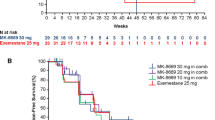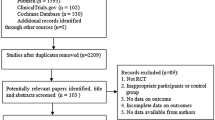Abstract
Idoxifene is a novel selective oestrogen receptor modulator (SERM) which had greater binding affinity for the oestrogen receptor (ER) and reduced agonist activity compared with tamoxifen in preclinical studies. In a randomized phase II trial in 56 postmenopausal patients with progressive locally advanced/metastatic breast cancer we assessed whether idoxifene showed evidence of activity compared with an increased 40 mg/day dose of tamoxifen in patients who had previously demonstrated resistance to the standard 20 mg/day dose of tamoxifen. Of 47 patients eligible for response (25 idoxifene, 22 tamoxifen), two partial responses and two disease stabilizations (SD) for >6 months were seen with idoxifene (overall clinical benefit rate 16%, 95% CI 4.5–36.1%). The median duration of clinical benefit was 9.8 months. In contrast, no objective responses were seen with the increased 40 mg/day dose of tamoxifen, although two patients had SD for 7 and 14 months (clinical benefit rate 9%, 95% CI 1.1–29.2%). Idoxifene was well tolerated and the reported possible drug-related toxicities were similar in frequency to those with tamoxifen (hot flushes 13% vs 15%, mild nausea 20% vs 15%). Endocrine and lipid analysis in both groups showed a similar significant fall in serum follicle-stimulating hormone and luteinizing hormone after 4 weeks, together with a significant rise in sex hormone binding globulin levels and 11% reduction in serum cholesterol levels. In conclusion, while idoxifene was associated with only modest evidence of clinical activity in patients with tamoxifen-resistant breast cancer, its toxicity profile and effects on endocrine/lipid parameters were similar to those of tamoxifen.



Similar content being viewed by others
References
McGuire WL (1978) Hormone receptors; their role in predicting prognosis and response to endocrine therapy. Semin Oncol 5:428
Early Breast Cancer Trialists Group (1998) Tamoxifen for early breast cancer; an overview of the randomised trials. Lancet 351:1451
Encarnacion CA, Ciocca DR, McGuire WL, Clark GM, Fuqua SA, Osborne CK (1993) Measurement of steroid hormone receptors in breast cancer patients on tamoxifen. Breast Cancer Res Treat 26:237
Johnston SRD, Saccani-Jotti G, Smith IE, Salter J, Newby J, Coppen M, Ebbs SR, Dowsett M (1995) Changes in oestrogen receptor, progesterone receptor and pS2 expression in tamoxifen-resistant human breast cancer. Cancer Res 55:3331
Buzdar A, Jonat W, Howell A, Jones SE, Blomqvist C, Vogel CL, Eiermann W, Wolter JM, Azab M, Webster A, Plourde PV (1996) Anastrozole, a potent and selective aromatase inhibitor, versus megestrol acetate in postmenopausal women with advanced breast cancer: results of overview analysis of two phase III trials. J Clin Oncol 14:2000
Howell A, De Friend D, Robertson J, Blamey R, Walton P (1995) Response to the pure antioestrogen ICI 182,780 in tamoxifen resistant breast cancer. Lancet 345:29
Howell A, Dodwell DJ, Laidlaw I (1990) Tamoxifen as an agonist for metastatic breast cancer. In: Goldhirsch A (ed) Endocrine therapy of breast cancer. Springer Verlag, New York, p 49
Johnston SRD, Riddler S, Haynes BP, A’Hern R, Smith IE, Jarman M, Dowsett M (1997) The novel antioestrogen idoxifene inhibits the growth of human MCF-7 breast cancer xenografts and reduces the frequency of acquired antioestrogen resistance. Br J Cancer 75:804
Johnston SR, Haynes BP, Sacks NP, McKinna JA, Griggs LJ, Jarman M, Baum M, Smith IE, Dowsett M (1993) Effect of oestrogen receptor status and time on the intra-tumoural accumulation of tamoxifen and N-desmethyltamoxifen following short-term therapy in human primary breast cancer. Breast Cancer Res Treat 28:241
Chander SK, McCague R, Luqmani Y, Newton C, Dowsett M, Jarman M, Coombes RC (1991) Pyrrolidino-4-iodotamoxifen and 4-iodotamoxifen, new analogues of the antioestrogen tamoxifen for the treatment of breast cancer. Cancer Res 51:5851
Coombes RC, Haynes BP, Dowsett M, Quigley M, English J, Judson IR, Griggs LJ, Potter GA, McCague R, Jarman M (1995) Idoxifene: report of a phase I study in patients with metastatic breast cancer. Cancer Res 55:1070
Howell A, Mackintosh J, Jones M, Redford J, Wagstaff J, Sellwood RA (1998) The definition of the ‘no change’ category in patients treated with endocrine therapy and chemotherapy for advanced carcinoma of the breast. Eur J Cancer Clin Oncol 24:1567
Goldhirsch A, Joss RA, Leuenberger U, Cavalli R, Ryssel HJ, Brunner KW (1982) An evaluation of tamoxifen dose escalation in advanced breast cancer. Am J Clin Oncol 5:501
Stewart JF, Minton MJ, Rubens RD (1982) Trial of tamoxifen at a dose of 40 mg daily after disease progression during tamoxifen therapy at a dose of 20 mg daily. Cancer Treat Rep 66:1445
Watkins SM (1988) The value of high dose tamoxifen in postmenopausal breast cancer patients progressing on standard doses: a pilot study. Br J Cancer 57:320
Hayward JL, Carbone PP, Heuson J-C, Kumaoka S, Segaloff A, Rubens RD (1977) Assessment of response to therapy in advanced breast cancer. Eur J Cancer 13:89
Dowsett M, Goss PE, Powles TJ, Hutchinson G, Brodie AM, Jeffcoate SL, Coombes RC (1987) Use of aromatase inhibitor 4-hydroxyandrostenedione in post-menopausal breast cancer; optimisation of therapeutic dose and route. Cancer Res 47:1957
Johnston SRD, Smith IE, Doody D, Jacobs S, Robershaw H, Dowsett M (1994) The clinical and endocrine effects of the oral aromatase inhibitor vorozole in postmenopausal patients with advanced breast cancer. Cancer Res 54:5875
Haynes BP, Grimshaw RM, Griggs LJ (1998) Pharmacokinetics of idoxifene and tamoxifen in a randomised phase II trial in breast cancer patients who have relapsed on tamoxifen. Ann Oncol 9 [Suppl 2]:177
Dombernowsky P, Smith IE, Falkson G, Leonard R, Panasci L, Bellmunt J, Bezwoda W, Gardin G, Gudgeon A, Morgan M, Fornasiero A, Hoffmann W, Michel J, Hatscheck T, Tjabbes T, Chaudri HA, Hornberger U, Trunet PF (1998) Letrozole, a new oral aromatase inhibitor for advanced breast cancer: double-blind randomised trial showing a dose effect and improved efficacy and tolerability compared with megestrol acetate. J Clin Oncol 16:453
Gottardis M, Jordan VC (1998) Development of tamoxifen-stimulated growth of MCF-7 tumors in athymic mice after long-term antioestrogen administration. Cancer Res 48:5183
Wiebe VJ, Osborne CK, McGuire WL, DeGregorio MW (1992) Identification of oestrogenic tamoxifen metabolite(s) in tamoxifen-resistant human breast tumors. J Clin Oncol 10:990
Osborne CK, Coronado E, Allred DC, Wiebe V, DeGregorio M (1991) Acquired tamoxifen resistance: correlation with reduced breast tumor levels of tamoxifen and isomerisation of trans-4-hydroxytamoxifen. J Natl Cancer Inst 83:1477
Osborne CK, Wiebe VJ, McGuire WL, Ciocca DR, DeGregorio MW (1992) Tamoxifen and the isomers of 4-hydroxytamoxifen in tamoxifen-resistant tumors from breast cancer patients. J Clin Oncol 10:304
Johnston SRD, Haynes BP, Smith IE, Jarman M, Sacks NP, Ebbs SE, Dowsett M (1993) Acquired tamoxifen resistance in human breast cancer and reduced intra-tumoural drug concentration. Lancet 342:1521
McCague R, Parr IB, Haynes BP (1990) Metabolism of the 4-iodo derivative of tamoxifen by isolated rat hepatocytes. Biochem Pharmacol 40:2277
Haynes BP, Parr IB, Griggs LJ (1991) Metabolism and pharmacokinetics of pyrrolidino-4-iodotamoxifen in the rat. Breast Cancer Res Treat 19:174
Wolf DM, Langan-Fahey SM, Parker CJ, McCague R, Jordan VC (1993) Investigation of the mechanism of tamoxifen-stimulated breast tumour growth with nonisomerizable analogues of tamoxifen and metabolites. J Natl Cancer Inst 85:806
Osborne CK, Jarman M, McCague R, Coronado EB, Hilsenbeck SG, Wakeling AE (1994) The importance of tamoxifen metabolism in tamoxifen-stimulated breast tumour growth. Cancer Chemother Pharmacol 34:89
Lee ES, Schafer JM, Yao K, England G, O’Regan RM, De Los Reyes A, Jordan VC (2000) Cross-resistance of triphenylethylene-type antiestrogens but not in ICI 182,780 in tamoxifen-stimulated breast tumours grown in athymic mice. Clin Cancer Res 6:4893
Howell A, Robertson JF, Quaresma Albano J, Aschermannova A, Mauriac L, Kleeberg UR, Vergote I, Erikstein B, Webster A, Morris C (2002) Fulvestrant, formerly ICI 182,780, is as effective as anastrozole in postmenopausal women with advanced breast cancer progressing after prior endocrine treatment. J Clin Oncol 20:3396
Hardcastle IR, Rowlands MG, Houghton J (1995) 4′-Substituted analogues of idoxifene; antioestrogens and calmodulin antagonists. Biorganic Med Chem Lett 5:805
Langhan-Fahey SM, Tormey DC, Jordan VC (1990) Tamoxifen metabolites in patients on long-term adjuvant therapy for breast cancer. Eur J Cancer 26:883
Patterson JS, Settatree RS, Adam HK, Kemp JV (1980) Serum concentrations of tamoxifen and major metabolites during long-term Nolvadex therapy, correlated with clinical response. In: Mouridsen HT, Palshof T (eds) Breast cancer—experimental and clinical aspects. Pergamon Press, Oxford, p 89
Bratherton DG, Brown CH, Buchanan RB, Hall V, Kingsley Pillers EM, Wheeler TK, Williams CJ (1984) A comparison of two doses of tamoxifen (Nolvadex) in post-menopausal women with advanced breast cancer. Br J Cancer 50:199
Jordan VC, Fritz NF, Tormey DC (1987) Long-term adjuvant therapy with tamoxifen: effects on sex hormone binding globulin and antithrombin III. Cancer Res 47:4517
McFadyen IJ, Raab G, Forrest AP, Langlands AO, Stewart HJ, Roberts MM, Hamilton T, Golder MP, Groom GV, Griffiths K (1979) The effect of tamoxifen and stilboestrol on plasma hormone levels in post-menopausal women with advanced breast cancer. Clin Oncol 5:251
Love RR, Newcomb PA, Wiebe DA, Surawicz TS, Jordan VC, Carbone PP, DeMets DL (1990) Effects of tamoxifen therapy on lipid and lipoprotein levels in post-menopausal women with node-negative breast cancer. J Natl Cancer Inst 82:1327
Delmas P, Mulder H, Eastell R, et al (1998) Idoxifene reduces bone turnover in osteopenic postmenopausal women. Bone 23:S494
Mulder H, Wasnich R, Eastell R, et al (1998) The effects of idoxifene on markers of cardiovascular risk in osteopenic postmenopausal women. Eur Heart J 19:237
Arpino G, Nair Krishnan M, Doval Dinesh C, Bardou VJ, Clark GM, Elledge RM (2003) Idoxifene versus tamoxifen: a randomized comparison in postmenopausal patients with metastatic breast cancer. Ann Clin Oncol 14:233
Acknowledgements
This study was conducted by the Cancer Research Campaign. We acknowledge the support of Judith Bliss from the Institute of Cancer Research in the analysis of data and statistical support. The pharmacokinetic, endocrine and lipid analyses were supported by a separate programme grant from the Cancer Research Campaign to the CRC Centre for Cancer Therapeutics and the Department of Academic Biochemistry at the Institute of Cancer Research and Royal Marsden Hospital. Dr. Ray McCague and Dr. Ian Hardcastle from the CRC Centre for Cancer Therapeutics isolated and synthesized the metabolites of idoxifene. Idoxifene was subsequently licensed to SmithKline Beecham Pharmaceuticals through the British Technology Group.
Author information
Authors and Affiliations
Corresponding author
Additional information
This work is presented on behalf of the Cancer Research UK Phase I/II Committee.
Rights and permissions
About this article
Cite this article
Johnston, S.R.D., Gumbrell, L.A., Evans, T.R.J. et al. A Cancer Research (UK) randomized phase II study of idoxifene in patients with locally advanced/metastatic breast cancer resistant to tamoxifen. Cancer Chemother Pharmacol 53, 341–348 (2004). https://doi.org/10.1007/s00280-003-0733-6
Received:
Accepted:
Published:
Issue Date:
DOI: https://doi.org/10.1007/s00280-003-0733-6




